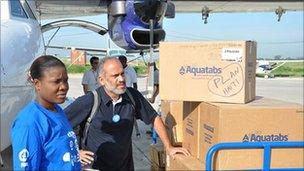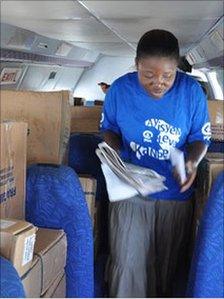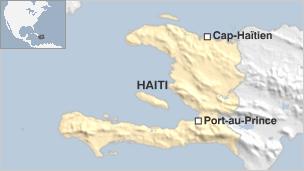Haiti cholera protests 'hampering aid operation'
- Published

Medical supplies for dealing with cholera are needed in remote parts of Haiti
The disaster response co-ordinator with the NGO Plan International, Dr Unni Krishnan, describes how those battling the cholera outbreak in Haiti are facing many new challenges and risks:
At Port-au-Prince airport, our four-member team is getting ready to fly on a chartered plane to Ouanaminthe airstrip.
Plan International has worked in Haiti for 30 years and operates in Ouanaminthe, in the Cap Haitien region in the north-east of Haiti, near the border with the Dominican Republic. The area has been badly hit and is considered as the flashpoint of the cholera outbreak that has so far claimed more than 1,250 lives.
The group consists of Maria, a doctor colleague from Spain with extensive experience dealing with cholera; Dorris, a water and sanitation expert from Ecuador; Sandra from our Haitian team; and myself.
I have worked in cholera response in the past, but what is unfolding here in Haiti is difficult to capture in words. I am currently deployed as leader of the cholera response team. In addition to our frontline staff, we are deploying public health experts and doctors.
The small, rusty Czech plane is also loaded up to the cabin roof with aid boxes - oral rehydration kits and other materials. As we fasten our seatbelts I smell soap, one of the other items on board.
Complications

The outbreak of cholera is the first in Haiti for decades
At the airport I meet some Bangladeshi doctors from the International Centre for Diarrhoeal Disease Research (ICDDR), which is helping fight cholera here.
This is the first time in generations that cholera has been reported in Haiti.
Fighting it is not rocket science - it is a very preventable disease and most people will make a full recovery if given quick, simple rehydration and treatment in critical situations.
However, the protests, weak health systems, a limited infrastructure that crumpled during the earthquake and other disasters, and a lack of understanding are making it very complicated to get help to those in need.
Violence and disease make a deadly combination.
Cramped, squalid conditions in the sprawling city camps are perfect breeding grounds, but equally it is very difficult to reach people in isolated rural areas, such as in the north. And people who contract cholera can die within hours if untreated.
Mid-air decision
Our original plan to fly to Cap Haitien airport was abandoned because it is shut following days of escalating anti-United Nations protests and violence.

Our 30-minute flight to Ouanaminthe airstrip was going well but we suddenly hit bad weather and turbulence. The captain says we can't land.
At 10,000 feet (3,000m) he gives us three options: Fly back to Port-au-Prince, land in Cap Haitien or consider landing across the border in Santo Domingo. This is a rare mid-air moment - three possible options and destinations!
Time is ticking away and a quick decision is needed. I scan a crumpled black-and-white printout of Haiti, weigh up all the options and 30 seconds later suggest we divert the ageing plane to Cap Haitien.
I tell my anxious colleagues that it is just another few minutes away. The captain's confident voice is a reassurance.
We battle through nasty weather and land safely! Clapping and cheering from the relieved team lasts for more than a minute. We all shake the crew's hands and hug each other.
Protests
Our colleagues, who were waiting for us at Ouanaminthe airstrip, divert their vehicles to Cap Haitien.
But outside the airport we spot a few local people gathering for a demonstration. They are on their motorcycles and look agitated. Our head of security Alex, who is back in Port-au-Prince, tells us to stay inside the airport until he gets clearance from the UN that it is safe to leave.
On the road from Cap Haitien to Fort Liberte we witness a few more demonstrations linked to the elections scheduled for 28 November. There is anxiety in the air.
We get a security update from Alex: Four Chilean nationals working for an NGO have been attacked in Port-au-Prince by a group of people. It is not good news and we carefully scan the road as we drive along, before we finally arrive safely.
We meet fellow aid workers, working for Merlin and the Pan American Health Organisation, and discuss plans. We need a contingency plan on how to continue working if there is a security shutdown.
We need to have time on our side in the fight against cholera, as every minute counts and time is ticking away.
- Published22 November 2010
- Published10 November 2010
- Published23 November 2010
- Published12 November 2010